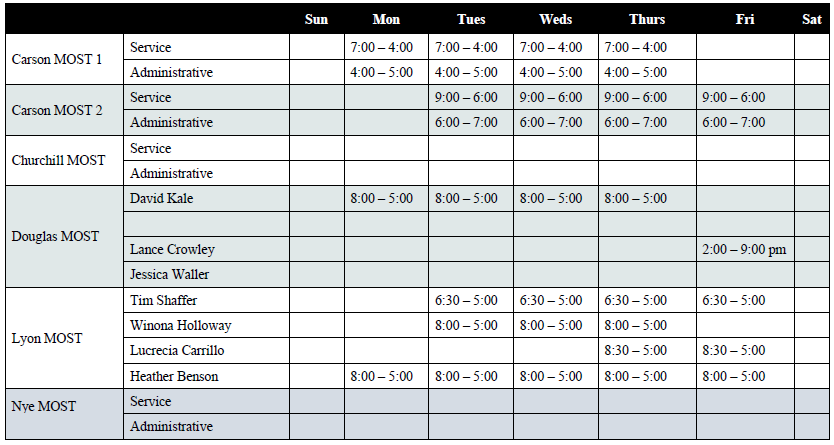Mobile Outreach Safety Team
MOST (Mobile Outreach Safety Team)
MOST can be called by anyone to assess a person’s mental health status and needs. This program is working to keep persons out of the criminal justice system. MOST can assist with directing and/or transporting people in crisis to the most appropriate resources to address their needs immediately.
The primary duties of clinical members of the MOST Team are as follows:
- MOST clinicians will ride along with law enforcement from many states jurisdictions (Reno Police Department, Sparks Police Department, Washoe County Sheriff’s Office, Carson City, Douglas ) to provide crisis intervention services in response to a call for service
- Provide skilled intervention capabilities for situations requiring a “diagnostic” Legal 2000 where officers and/or paramedics do not have the necessary training and background to complete a legal hold. Situations may include suicidal plan and intent, homicidal plan and intent, severe self-neglect, gravely disabled, self-mutilation etc.
- Complete “Persons in Crisis” welfare checks and/or contact with problematic frequent users of services to promote medication compliance, access to resources, and wellness promotion to reduce calls for service and frequent hospitalizations.
- Provide skilled assessment to encourage voluntary use of community resources to prevent future crises. Offer assistance in connecting with resources as determined by the client and clinician.
- Connect individuals in crisis to local resources to provide a long-term support network for their needs.
- Provide educational resources for law enforcement to expand the body of knowledge about mental illness and techniques available to address the phenomenon.
- Build working relationships with local agencies to foster community support for the mentally ill.
- Provide follow-up information to referring officers or community referrals as deemed appropriate or needed.
- Utilize the services of the MOST Case Manager to ensure linkages to ongoing mental health care for those who need assistance.
Referrals to MOST may come from any source in the community, but most typically will be generated from the sources noted below.
- Law Enforcement: Officers and non-sworn staff may make referrals from day, swing, and graveyard shifts as they identify persons with behavioral health issues, including extreme substance use concerns that impact a person’s mental health.
- Community Providers: MOST referrals are accepted from public and private community providers when they believe a follow-up contact by MOST will be beneficial to persons with behavioral health concerns.
- Family: Family members may contact MOST when they have a concern about behaviors or actions and believe contact with the MOST team will be beneficial.
- Self-Referral: Individuals may self-refer if they are in crisis, feel as if they are at risk of crisis, or are unable to access community resources due to physical and/or mental difficulties.
Publications and Reports
| Type | Group | Name | Region | Date | Download |
|---|---|---|---|---|---|
| MOST | Regional MOST Coordinator Meeting 11_18_2025 | Southern | 01/05/2026 | Preview Download | |
| Best Practices, Criminal Justice System (CJS), F.A.S.T.T., MOST | Nevada Behavioral Health Programming Across the Sequential Intercept Model (SIM) v. 1.0 | Nevada Statewide, Northern, Rural, Southern | 07/23/2024 | Preview Download | |
| Advocacy, Best Practices, Data, Education, MOST, Resources | Mobile Outreach Safety Teams – MOST Year 1 Evaluation Report | Nevada Statewide | 12/13/2022 | Preview Download |


